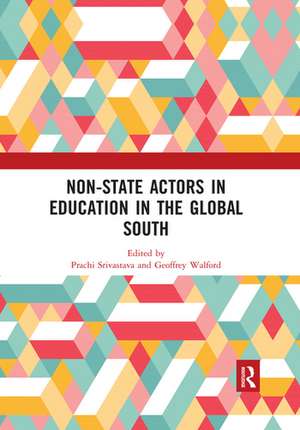Non-State Actors in Education in the Global South
Editat de Prachi Srivastava, Geoffrey Walforden Limba Engleză Paperback – 30 iun 2020
Within this debate, several empirical questions abound. Do students from poorer backgrounds achieve as well in private schools as their advantaged peers? What are the relative out-of-pocket costs of accessing private schooling compared to government schooling? Is fee-paying non-state provision ‘affordable’ to the poorest households? What is the nature of the education market at different levels? What are the relationships between different non-state actors and the state, and how should they conduct themselves? The chapters in this volume present new empirical evidence and conduct critical analysis on some of these questions.
This book was originally published as a special issue of the Oxford Review of Education.
Preț: 172.64 lei
Preț vechi: 215.73 lei
-20% Nou
Puncte Express: 259
Preț estimativ în valută:
33.03€ • 35.100$ • 27.84£
33.03€ • 35.100$ • 27.84£
Carte tipărită la comandă
Livrare economică 23 aprilie-07 mai
Preluare comenzi: 021 569.72.76
Specificații
ISBN-13: 9780367518479
ISBN-10: 0367518473
Pagini: 154
Dimensiuni: 174 x 246 x 13 mm
Greutate: 0.45 kg
Ediția:1
Editura: Taylor & Francis
Colecția Routledge
Locul publicării:Oxford, United Kingdom
ISBN-10: 0367518473
Pagini: 154
Dimensiuni: 174 x 246 x 13 mm
Greutate: 0.45 kg
Ediția:1
Editura: Taylor & Francis
Colecția Routledge
Locul publicării:Oxford, United Kingdom
Public țintă
Postgraduate, Professional, and UndergraduateCuprins
Introduction. Non-state actors in education in the Global South 1. Does private schooling narrow wealth inequalities in learning outcomes? Evidence from East Africa 2. Is there a private schooling market in poor neighbourhoods in Maputo, Mozambique? Exploring the role of the non-state education sector 3. ‘Affordable’ private schools in South Africa. Affordable for whom? 4. How are private school enrolment patterns changing across Indian districts with a growth in private school availability? 5. The myth of free and barrier-free access: India’s Right to Education Act—private schooling costs and household experiences 6. Extending access to low-cost private schools through vouchers: an alternative interpretation of a two-stage ‘School Choice’ experiment in India 7. Non-state actors, and the advance of frontier higher education markets in the global south 8. Towards a human rights framework to advance the debate on the role of private actors in education
Notă biografică
Prachi Srivastava is Associate Professor in Education and International Development at the University of Western Ontario, Canada, Adjunct Professor, School of International Development, University of Ottawa, Canada, and Senior Visiting Fellow at the University of Sussex, UK. She has been conducting research on non-state private actors in education in the Global South for more than 15 years, and is credited as coining the term, ‘low-fee private schools’. She has published widely on global education policy, low-fee private schooling, and privatisation and the right to education.
Geoffrey Walford is Emeritus Professor of Education Policy at the University of Oxford, UK. He has authored or edited more than 30 books on education policy, private education and ethnography, and published many articles and book chapters. He has been Editor of the British Journal of Educational Studies and the Oxford Review of Education, and remains Deputy Editor of Ethnography and Education.
Geoffrey Walford is Emeritus Professor of Education Policy at the University of Oxford, UK. He has authored or edited more than 30 books on education policy, private education and ethnography, and published many articles and book chapters. He has been Editor of the British Journal of Educational Studies and the Oxford Review of Education, and remains Deputy Editor of Ethnography and Education.
Descriere
Fuelled by social equity concerns, there have been vigorous debates on the appropriateness of certain non-state actors, particularly those with commercial and entrepreneurial motives, to meet universal education goals. There are further questions on the relative effectiveness of government and private schooling in delivering good learning outcomes for all. The chapters in this volume present new empirical evidence and conduct critical analysis on these questions. This book was originally published as a special issue of the Oxford Review of Education.
